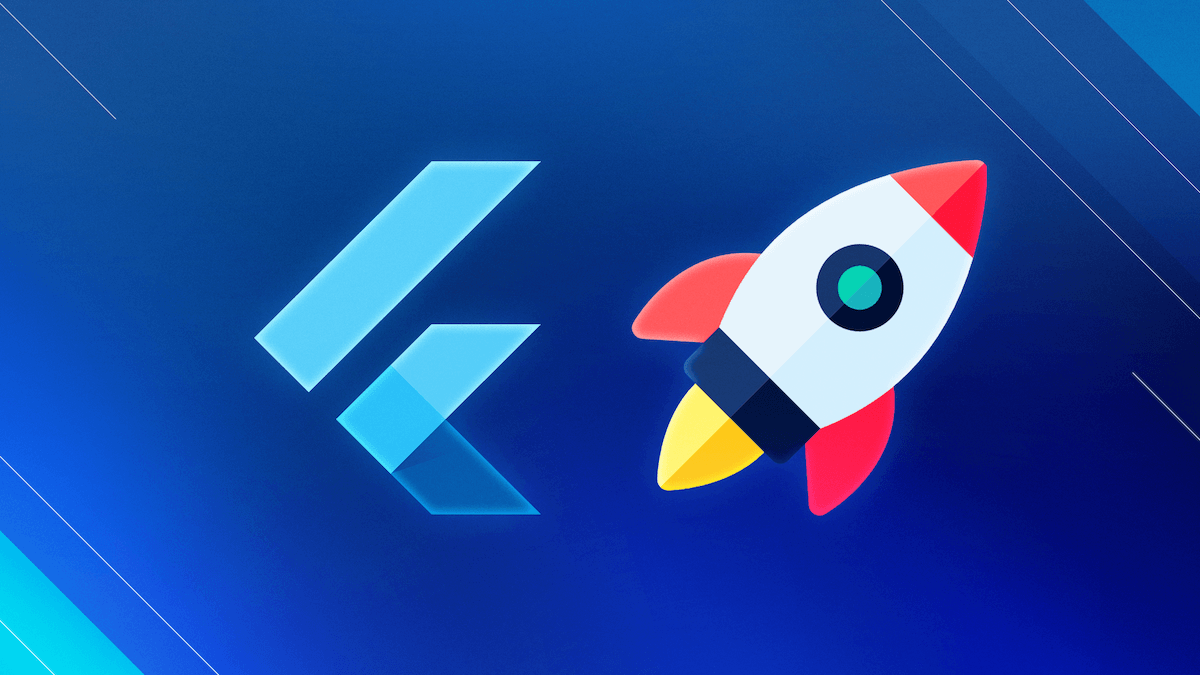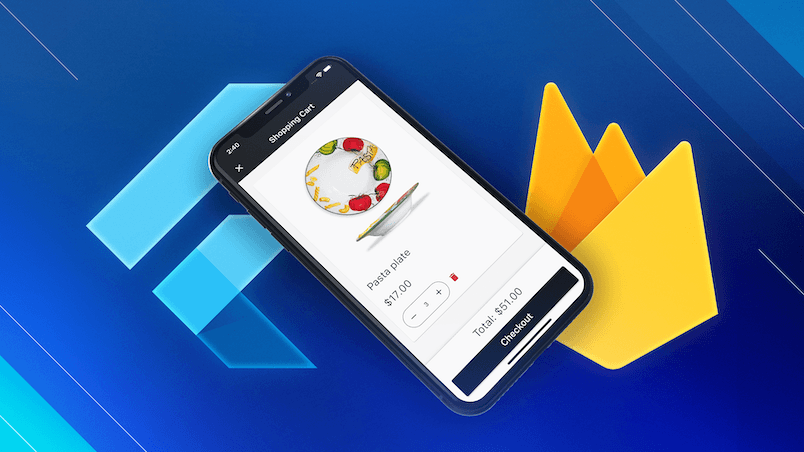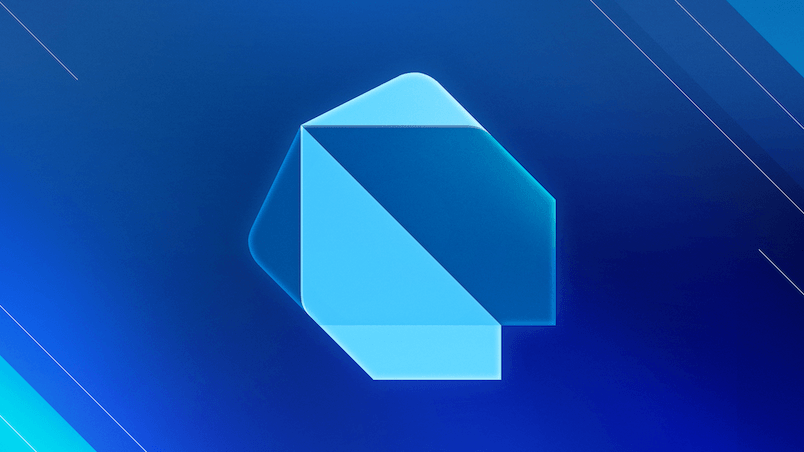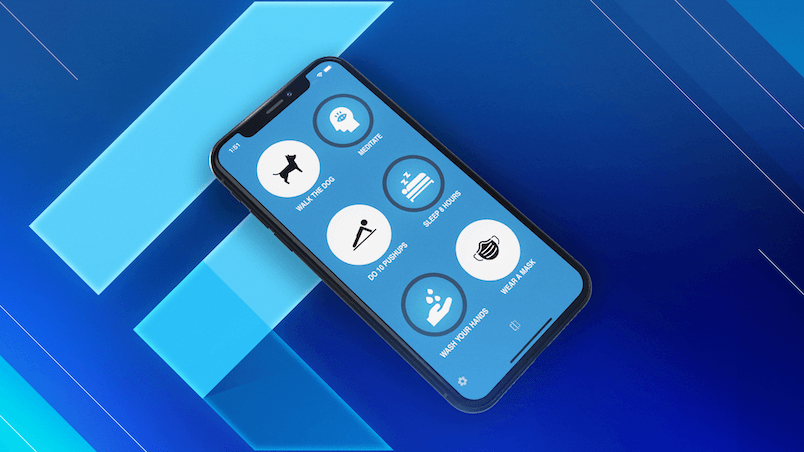At the passing of every new year, I share a complete retrospective of my journey creating Flutter tutorials and courses.
I do this mainly to hold myself accountable and reflect on what I have learned. But also to share my journey with all my readers transparently and honestly.
In this 2021 edition, I have much to share as I've been active on many fronts.
So let me get started with my goals from last year.
Goals from last year
- ✅ Reach $6,000 in monthly average revenue
- ❌ 200K pageviews / ✅ 50K unique visitors per month on my website
- ✅ Grow my newsletter to 10K subscribers
- ❌ Grow to 100K views per month on YouTube, ❌ 40K subscribers
- ✅ Double Twitter followers to 10K
To be honest, I didn't think I'd reach $6K in revenue.
But I made it, making an average of $6,130 over the last four months. And it feels great!
Though I can't get complacent as course sales have been trending down lately and I expect a slow start in 2022 (more on this below).
So let me share a complete breakdown of all my numbers in 2021.
My Revenue in 2021
In 2021, I made a total revenue of $69,532, which is a 62% increase over last year.
Here's a breakdown by income stream:
- Udemy: $34,879
- Teachable: $21,521
- Affilate Sales: $4,726
- Sponsors: $2,632
- Training / Consulting: $2,496
- Adsense (YouTube Ads): $1,160
- Bulk Sales: $1,200
- Zero To Mastery (royalties): $946
- Tips: $100

Udemy and Teachable account for all my course sales and made up over 80% of the entire pie.
No surprise here: the core of my business is to sell online courses.
But I'm very happy that I've added sponsors and affiliate sales to the mix, as they brought in some extra revenue for nearly zero effort.
Here's my revenue per month:

The big spike in May was due to the launch of my Flutter animations course, my first real attempt at launching and marketing a course outside Udemy.
And from August onwards, various income streams have started adding up. This is a good sign as not all my eggs are in one basket. But it also required some active promotion work on my part (Black Friday promos, affiliate marketing).
And perhaps, this sums up my business in 2021: the overall trend is up, but I still have much to do to get where I want to be.
Aside from my revenue, here's an overview of my expenses in 2021.
Expenses
In 2021, I spent a total of $20,660.
At nearly 30% of my revenue, these are very high expenses for a content creation business.
Here's the breakdown:
- Outsourcing (design, development, captioning): $13,455
- ConvertKit (email automation): $2,161
- Accountant: $1,874
- Teachable (course platform): $1,117
- One-offs (books, courses): $437
- Descript (video editing): $360
- Ahrefs (SEO): $301
- Insurance: $185
- Hosting (Netlify / Vercel): $130
- Paperform (Surveys): $123
- Plausible (Analytics): $102
- Feedletter (Feedback): $100
- Hey (email): $100
- Vimeo: $96
- Kraken (image compression): $54
- GitHub: $35
- Zoom: $12

The biggest slice of the pie is outsourcing costs due to a complete redesign of my site. If I take this out of the equation, my average monthly expenses drop to $600, or just over 10% of my revenue.
Fun fact: November was my second best month for revenue at $6,500, but I still made a loss of $305 due to all the outsourcing work on my site.
Beyond revenue numbers alone, I have much to share about my courses, website, newsletter, Twitter, YouTube, and more.
Let's take a look.
Courses
2021 has been a year of transition.
With the launch of my Flutter animations course, I took a big step away from Udemy as my primary platform, and decided to host all new courses on Teachable where I get to choose the price and have access to student emails.
The revenue numbers tell me that this was the right decision.
But it also meant that I had to learn a lot more about marketing and sales myself. While this was a painful endeavor initially, that big spike in sales made it 100% worth it:

But with the launch of Flutter 2 and Null Safety back in March, my flagship Flutter & Firebase course has become outdated and sales have been slowly declining as a result.
In fact, my total Udemy revenue has been declining in 2021 and this is something I have to accept until I launch new courses to refresh my lineup.
Takeaway: Just like software will rot and stop functioning if not properly maintained, programming courses can get outdated quickly. If there aren't too many breaking changes, smaller updates are feasible. But sometimes it's best to throw everything out of the window and make a brand new course.
As far as Teachable goes, my Flutter animations course did just over $20K in sales since launch ($18K was my minimum goal) and I have already shared all my insights here:
One very important thing I learned is that over 50% of the lifetime revenue of the course comes from the initial launch period, with sales falling quite sharply after that (apart from occasional promotions like Black Friday).
This gives me some very important data points for my next launches, so I can better budget things and work out pricing.
Affiliate Sales
This is something that worked out very well this year.
Back in September, my friend Robert Brunhage launched his Ultimate Flutter Course and asked me if I wanted to become an affiliate.
Initially, I was a bit hesitant. After all, I make a living selling Flutter courses myself. But his offer was enticing so I checked out his course, made sure it was high quality, and decided it would be very valuable to my audience.
I went the extra mile by helping Robert with his landing page and course content, as I genuinely wanted him to succeed.
And when launch day came, I promoted it to my entire email list with a very personal announcement and recommendation.
Since September, I promoted his course twice and made a total of $4,650 in affiliate commissions. That's some great ROI right there! 🚀
Beyond that, I also soft-launched my own affiliate program by reaching out to prominent members of the Flutter community.
Some of them went on to promote my courses, with some modest success so far. By the time I launch my next course, I want to have more affiliates onboard and get extra sales that way.
Bulk sales
One advantage of having courses for sale is that sometimes companies want to buy many copies in bulk (either for their teams or even to help out less privileged students around the world).
While I'm not disclosing the details of the companies that have requested this, bulk sales have contributed to my revenue. Every little helps!
Zero To Mastery
Sometime this year I have become an instructor for Zero To Mastery, and added my Dart course to their collection.
We also explored whether I could create new courses for ZTM, but the timing hasn't worked out for 2021 as I've been busy with other parts of the business.
Having seen their other courses and how they run their community, I have only good things to say about ZTM and I'm happy about the extra revenue I get from their school.
Next up, I want to talk about my newsletter and website.
My Flutter Newsletter
This year I learned how important it is to have an engaged email list. So much so that nearly all sales of my latest course came from direct marketing to my email list.
I have learned a ton about email marketing from Stacking the Bricks.
If I had to sum it up, I would say this:
Wanna sell? Then keep your email list warm by sending a lot of valuable content over time. This builds trust. And once people trust you and your content, sales become much easier.
That bears two questions:
- How to build a large email list?
- How to keep it engaged?
How to build a large email list?
I'm definitely not an expert on this. I tried to grow my list organically by offering my free Flutter email course and placing sign-up forms on most pages on my site.
But even after my recent website redesign, organic newsletter signups are only 0.5% of all site visitors.
That means I still have a long way to go and I hope to reach at least 1% conversion in 2022.
How to keep an email list engaged?
I think I figured it out after discovering this guide about creating Content Mixtapes with ConvertKit.
What I did was to take all my best articles and put them into a growing sequence that goes out to all my subscribers every Friday.
And every time I publish a new article, I add it as a new email to the end of the sequence.
That way, new subscribers will get all the emails in the sequence. This means that I have to keep all the old content up-to-date, but I no longer have to stress about writing stuff for new subscribers.
Honestly, I don't know what I would do without ConvertKit. It's truly an amazing piece of software for email automation.
Getting feedback (and acting upon it)
I've also integrated a small feedback system at the bottom of each email (using FeedLetter), so that I can see which emails perform better:

With this in place, I can continue to improve my emails for new subscribers based on all the feedback I receive.
My Website
Of all things I do as part of my business, this website has a special place in my heart. ❤️
That's where I publish new content, sell my courses, and get people to sign up to learn Flutter with my emails.
So I try to look after it as best as I can.
The importance of SEO
But a website is only valuable if its content is discoverable.
So this year I decided to work on SEO as part of my content strategy.
I published 39 new pieces of content (articles, videos, tips), including detailed guides about essential topics such as state management with Riverpod and how to parse JSON in Dart.
And for each of these articles, I did some keyword research so that they would show up on Google search results.
In the end, I got 459K unique visitors and 658K pageviews in 2021:

The site now gets over 50,000 visitors each month and all my SEO efforts have paid off.
Compared to all other traffic sources, there's no match: Google search wins by a long shot.

My most visited article about Dart Null Safety was opened by nearly 50K visitors, with a few others over 20K:

There's so much more I can do and I hope to step up my SEO game further in 2022, but for now I'm very happy with the results.
Outsourcing Website Redesign
I'll be honest: my site was looking kind of ugly and I strongly felt it could do with a redesign.

So I decided to make a bold move and outsource both design and development. The end result came at a price (nearly $12K), but I'm very happy with how the site has turned out and I consider this an investment for the future.
Sponsorship
This is something I'm very glad I did.
I setup a sponsorship program back in January, and while I had a few empty slots in the first half of the year, things improved considerably and I was fully booked in Q4.
What's great about this program is that I have done zero outreach myself, and all sponsorship enquiries have come directly my way.
So far I have signed up 7 sponsors (some of them multiple times) and I'm very glad they came on board and helped me keep this site free for everyone:

With the growing traffic on the site, I've been able to steadily increase the sponsorship price.
And overall, sponsorship alone accounted for over $2,500 in revenue this year. Who knows, maybe I can even double that next year! 💪
Training and Consulting
I'll be honest: I played 2021 in hard mode, making nearly all my revenue from courses and other "semi-passive" income streams.
I had many opportunities to do paid consulting along the way, but I turned nearly all of them down as I didn't want to take time away from my business.
Still, with a bit of training and consulting services, I brought in $2,500 in 2021.
Depending on how things play out in 2022, I may bring back some of this, or even look into training for teams as a way to sell my Experience-as-a-Product. 😄
This year I learned that when used correctly, Twitter is a great platform for content creators.
And as it should be, the more you put in, the more you get out of it.
Here are some of the things that worked for me:
- Sharing useful tips directly gets more engagement/likes than just posting links to articles on my site (example).
- Early validation of content ideas. I can share things I'm working on, and only decide to make an article or video if there is enough interest (example).
- Reply to questions and use any suggestions to further improve my articles (example).
I've also spent a bit of time optimizing my Twitter profile, adding relevant links to my site and courses:

In the past, I used Twitter only to broadcast my new content. But this year I started engaging a lot more with others and their content, and built some good relationships along the way.
Twitter is the third source of traffic to my site behind Google and direct links, but it's my favorite channel for engagement.
Overall, in one year I more than doubled my Twitter followers from 5K to 11.5K, and I'm confident that with more effort I can reach 25K in 2022.
YouTube
How can I say it?
In 2021, YouTube was a flop for me.
I started with good intentions and published some videos in Q1. But none of them got the traction I wanted and I was getting a bit nervous about the very low ROI on my channel.
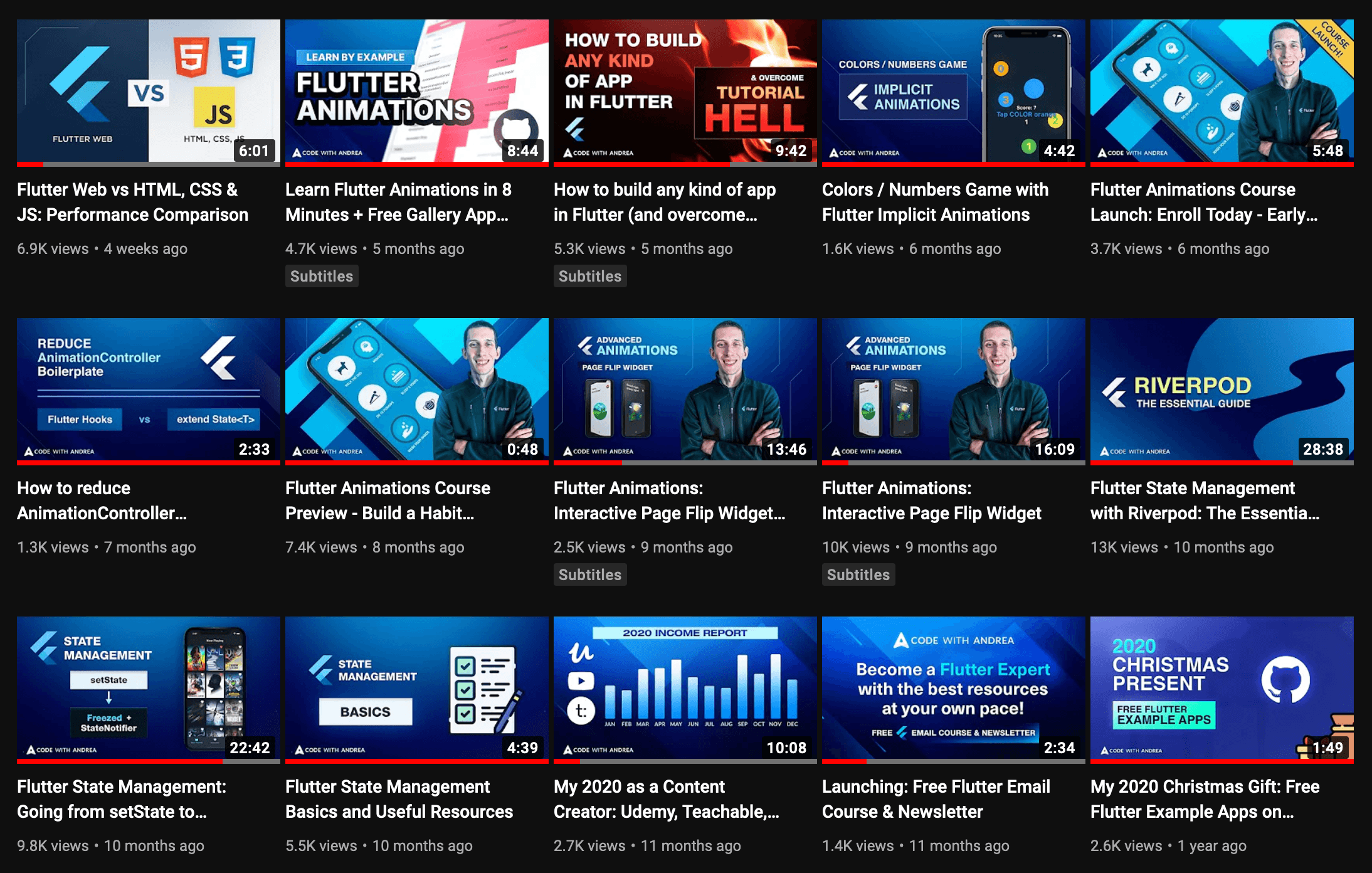
Somehow, things were a lot easier when I started. But now there are a million Flutter videos on YT and it's just a lot harder to stand out.
That meant that I had to step up my YouTube game.
But with all the other things I had going on, I kind of gave up and focused more on my site and courses for the time being.
With that said, in 2022 I want to turn things around and find some new formats that will resonate better with my audience.
Time Invested
All in all, 2021 was a very busy year and I spent a total of 1458 hours on my business (that's 28 hours / week).
Here's a breakdown by activity type:

My Flutter animations course alone took 370 hours to make. I also spent 189 hours writing articles, 170 hours working on my new site, and already 130 hours on my upcoming Flutter course.
My profit (before tax) was $49,002, meaning that I earned $34 per hour on average.
This is still far less than I'd make from freelancing. But I'm playing the long game and enjoy working on my business day in, day out.
I know that all my efforts are an investment for the future and I'm confident that this will start paying off in 2022.
So it's time to round up with my goals for next year.
Goals for 2022
- $100K in total revenue
- reach 100K monthly unique visitors on my website
- Grow my newsletter to 25K subscribers
- More than double my Twitter followers to 25K
- Reach 50K subscribers on YouTube
How am I planning to reach $100K in revenue?
- $50K from my next course launch
- $30K from my existing courses (and affiliate sales)
- $20K from all other revenue sources (sponsorship, YouTube ads, consulting, etc.)
How do I think I can make $50K from a single launch?
- Higher pricing: 500 sales at $100 each would do
- More advanced content: no point competing with all the other beginner courses out there
- Improved email marketing: I'll streamline everything I learned this year
- Affiliate sales: Affiliates should have enough incentive to promote my premium course if I give them a good rate
$100K: the one-man band dream
What gets me excited about $100K is that:
- it's a great goal to have as a one-man business
- it's enough to support myself and my family
- I can reinvest some of it and outsource more tasks
In 2022, I could outsource some marketing, video production, content creation, and whatever else my business needs so that I don't have to do everything myself.
If I can hit my revenue targets, I'll be able to create more content and better serve the Flutter community as a whole.
And while I plan to sell future courses at higher prices, I'll continue sharing a lot of my content for free on this site, Twitter, and YouTube.
Whether you've been following me since the beginning, or just joined recently, thank you!

I'm very excited to see where I can take this in 2022, and I hope you are too!
Happy New Year!
Andrea

